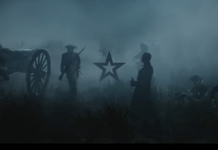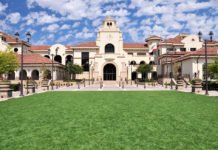
Temecula City Council, in the early morning hours Aug. 11, made the decision to keep the name Race, Equity, Diversity and Inclusion for its REDI Commission despite efforts from Temecula City Councilmember Jessica Alexander who brought forth an agenda item requesting a name change due to concerns by many who spoke out against it at earlier council meetings.
The REDI Commission, formed by the council July 14, 2020, had been under fire by many throughout the Temecula Valley for the perception that it would actually cause racial division, not unite the city, like it was expected to do.
During the Aug. 10 meeting, hundreds came out to voice their opinions on the REDI Commission with many taking to the steps of City Hall bearing signs expressing their displeasure with council, the commission itself and the use of the word race in the name beforehand in an organized protest.
The meeting, which was highly publicized by those opposing the REDI Commission, was so crowded that overflow space in Temecula’s Conference Center on City Hall grounds was utilized.
Alexander, who made the agenda item request following the July 27 city council meeting, said her goal was to have dialogue rather than councilmembers just stating their stance on the issue.

“That’s kind of what my thought was, to be able to bring some questions to the city council, have us discuss them and kind of go from there,” she said, adding that council could bring some things to the attention of everyone in attendance.”
Mayor Maryann Edwards advised that discussion would come following public comments so council could consider the input from the audience when making a decision regarding renaming the commission.
Alexander gave council her presentation saying that she hasn’t seen race and equity issues in the city.
“I have been here for seven months and there have not been many people, if any, that have come to me and said where the ball is getting dropped,” she said. “All I hear is comments about difficulties, but I want to be able to help those individuals, but I do not believe that it’s a race issue.”
Alexander reiterated her stance that “we are one human race,” and that if “you are a racist, you are actually against the human race.”

“That’s us as a whole,” she said.
Alexander shared a slide picturing her with Denton Burr, the local leader of the Black Lives Matter protests in Temecula, in a hug. She said they spoke and prayed together for over 40 minutes.
“We talked, we had conversations, he has my personal phone number,” she said. “There is nothing wrong with calling me and connecting with me, but act like a human being and bring me problems that I can actually solve.”
She brought up the use of images of George Floyd by the city and said that people have been called names all the time, and while it’s not right, just or fair, as a city councilmember it wasn’t her job to be at someone else’s dinner table to teach their children how to act. She brought up an incident at a Temecula Valley Unified School District high school showing a video where she claims a teacher is teaching Critical Race Theory, which she says is a big part of the problem.
“The fact of the matter is that I don’t believe that anybody has privilege over any other,” she said. “That’s why I got elected as a city councilmember.”
Alexander addressed the use of the word equity in the commission’s name saying she had a hard time wrapping her head around it and that it was rooted in CRT.
“The problem with CRT is if I worked really hard and I worked 40 to 60 hours a week and I actually own a business and became something, somebody who were not exactly where they want to be feels that I have to give them more,” she said. “I will tell you; I will gladly do it, but don’t force me to do it.”
Alexander said that when she hears people talking about white privilege, “it really bothers” her.

“It really ticks me off and it really should tick every person of color from white to black off. It really should,” she said.
Alexander went on to show a video from a REDI Commission meeting to make her point, saying that all the ideology and theories the commission is rooted in is “tainted from the beginning, making the whole thing bad.”
“I want to get rid of race and equity,” she said of the name. “I love diversity and inclusion. … If you don’t like where you live, then move somewhere else … .”
Those opposed stated much the same, saying they didn’t see racism that would justify the continuance of the REDI Commission and that the commission itself is creating racism and that they would like to see council eliminate the commission. Those in support wanted council to leave the name and commission intact.
Retired Veteran Rodney Jackson, who was the first speaker of the night, said that he didn’t know much about the commission and that he didn’t agree with everything that Alexander said but that he thought the city should be focusing on the positives, not the negatives.
“The bottom line is why don’t you take a different approach,” he asked. “Why don’t you focus on someone who is doing it the right way? … I just know when you focus more on those doing it the right way than those doing it the wrong way, you tend to get better results.”

Tim Thompson, senior pastor from 412 Church, said he wanted to thank Alexander for standing up for the community and then attacked Mayor Pro Tem Matt Rahn saying he wasn’t sure where Rahn stood in his religious beliefs, and that he seemed “dead to him spiritually.” He said that he understood that Edwards and Councilmember James “Stew” Stewart were both strong in their faith and while he wasn’t sure where Councilmember Zak Schwank was in his faith but that it didn’t bother him like his perception of Rahn’s faith did.
“I just watch the wickedness that Matt Rahn does and it disgusts me,” he said. “The thing is, I want to call upon you two specifically to consider what is happening here today and recognize what is going on. The vast majority of this community is with Jessica Alexander.”
Thompson said there was a small group of people who cheered when Alexander played a video of a teacher teaching Critical Race Theory to students at a Temecula High School
“They are celebrating wickedness, which you know is not biblical,” he said. “So as people who claim to be Christians, I want to remind you of something that even a little bit of sin will ruin the entire lump. This small little group of people over here who think they are so important that they and their message are important, it is wicked what they are saying, they are celebrating evil and I implore you to listen to the vast majority of people who are here that say we don’t want this in our community, it is wrong for our community, it is sin and it cannot be tolerated.”

Those opposed stated much the same, saying they didn’t see racism that would justify the continuance of the REDI Commission and that they would like to see council eliminate the commission.
Allison Donohoe-Beggs, a licensed clinical social worker with Riverside County Department of Social Services thanked council for forming the commission saying it made her “even more proud” of the city she lives in.
“As a social worker its important to me to work towards strengthening communities and ensuring everyone feels included. Honestly, I don’t see how anyone could be opposed to this beautiful purpose,” she said. “When you hear the opposition and the reasons they are opposed, I know you see even more the need for the REDI Commission.”
Donohoe-Beggs said the opposition, “on its own” was justifying the need for the commission and that she hoped council would take both the support and the opposition they were hearing as justification to keep the REDI Commission intact.
“Please do not change the purpose or the name,” she said.
Former TVUSD Board Member Julie Farnbach, who served as the representative for Trustee Area 4, said she had spent the past week watching the council videos from July’s meetings and knew she “had to get up and call a time-out.”

“I’m conservative Christian, Caucasian, obviously, and I need you and my local friends in the GOP club to know why I support the REDI Commission as presently constituted,” she said. “My values have not changed but my service on our school board over most of the past six years has broadened my perspective and taught me the hard way that divisive approaches make problems bigger.”
She said that she had learned from her own experience and there were more than two options and while it didn’t matter whether council changed the name or not, they learn from it and expand their outreach because of it.
“Whether we recover ourselves as a community after all of this, remains to be seen,” she said, adding that there was one detail regarding all the discussions and disagreements that did matter “immensely” to her and that was how people treat each other.
“That’s kind of the whole point of the REDI Commission,” she said. “It has been a long, exhausting, brutal couple of years for Californians. Our nerves are shot, our stress levels are off the charts and our patience is gone. Fair enough. I understand that. Well, let’s just take a couple of slow deep breaths. Because while we are preoccupied by cheers and jeers coming from the bleachers on both sides of this debate, there is a third view to be had and that is of the field littered with casualties that need triage. If you believe there is no racism in Temecula, you don’t get out enough.
She cited the thousands of hours she had spent over the past six years reading Temecula student statistics and bullying cases.
Farnbach fought back tears saying, “You would be shocked and appalled to see the data let alone to read what they are saying and doing to each other at school and thanks to smartphones in every kid’s pocket we are mostly hopeless to stop it.”
“We can treat leprosy nowadays but how do we heal what is left after the infection? How do we cure being invisible, ignored or unwanted, alone, targeted, bullied or harassed,” she asked. “I am no bleeding heart liberal, but our children and our grandchildren are watching. We need to stop fighting this win/lose battle and start building a win/win scenario.”
Farnbach said it was time to seek to understand others before demanding to be understood ourselves.
“We cannot become the bullies,” she said. “The real problem here isn’t political. It’s personal and the solution is we need to trust our principles and values that they can withstand opposition and argument and discussion, and we need to genuinely sit down and listen to each others pain. The suffering is real and it is deeply traumatic.”
Farnbach said that the anger is not productive, even when justified and that a spark of anger, like a wildfire, inflames whatever is nearby, “spreading quickly without control destroying indiscriminately,” leaving “ugly scorched earth” behind.
“Love, on the other hand, plants seeds, it nourishes them, and ultimately cultivates beautiful healthy growth,” she said. “So if you truly care about your community, your neighbors, your children, your grandchildren, their education, your property values, the crime rate, please, put down the incendiary signs, challenge the assumptions and pick up your gardening gloves.”
Farnbach said there was a lot of work to be done to repair the damage that had been done over the summer due to the divide over the REDI Commission.
Following more than three hours of public comments, the council held a discussion on renaming the REDI Commission.
Councilmember James “Stew” Stewart said the community is made up of different races and he suspects that the city could do better to reach those people who are not currently being reached while Councilmember Zak Schwank said that he was disgusted by some of the comments and apologized for not doing enough.
“We’ve heard a lot about we are all one race and that’s just not true,” Schwank said. “If we are speaking from a scientific perspective, you’d have a point, but we’re not. What I am hearing is that race doesn’t matter to some people in the community or they are using that as an argument about not discussing issues around race.”
Schwank said that the fact of the matter is that race does matter.

“Most, if not all people, identify with a given race and they are proud of their race,” he said. “To pretend that people don’t identify with a race is just another way to try to erase that lived experience from the fabric of the American Dream and these lived experiences are right here in Temecula. They are everywhere. This is America and if we genuinely want a more perfect union then we are going to have to put in the work.”
Mayor Pro Tem Matt Rahn said he saw a lot of hate, anger and built-up frustrations, but it was time to lower the temperature.
“Let’s not forget the actual history of what happened here,” he said. “The Pechanga tribe experienced one of the last massacres of Indians in the United States. Shortly after that that tribe was forced at gunpoint off their native land and onto the place where they are today.”
Rahn said council wasn’t asking residents to apologize, for a redistribution of wealth, or for any of the things that CRT claims or anything it espouses.
“We are asking for acknowledgement,” he said. “We don’t want to forget our past for fear of making those mistakes again.”
According to Rahn, every community has experienced some form of racism and that council was there to represent everyone in the community and that the REDI Commission could help council achieve that goal of full representation.
“We can’t start this conversation automatically as enemies,” he said. “… Just take the time before you start swinging the ax, just take the time to hear from us and learn from us first.”
Alexander said that people don’t see what goes on behind the scenes.
“As a city councilmember my job is to represent both sides,” she said. “… We can’t fight racism with racism, we can’t fight hate with hate. How do we do that? How can we come to this together? That’s what I’m looking for.”
Edwards said that building bridges and building relationships with those who felt underrepresented or ignored was what the REDI Commission would help council to achieve.
“We need those people, we care what they think,” she said. “It’s important what they think.”
Edwards went on to say that it all starts with each individual but that she didn’t want to see the hatred that had occurred at the meeting “anymore.”
“If we are going to let something like this divide us, we’re done,” she said. “We have to be able to come together and talk.”
Alexander suggested changing the name from REDI to the HEDI (Human Race, Equality, Diversity and Inclusion) Commission.
“Can we kind of come together?” she asked. “Why can’t we call it the human race, we are all human beings.”
Edwards quickly argued against the suggestion.
“We had so many people come up and say keep the REDI Commission,” she said. “We are protecting them but not letting race get in the way.”
Alexander said that by not considering a name change, council was ignoring the wants and needs of those who spoke out against the REDI Commission. The difference is a cultural one, not a racial one, she said.
Stewart, who said that he would have had a problem with the name REDI had he been on council at the time it was formed, argued that what he was seeing was what council intended and not what those against the REDI Commission were seeing which were two totally separate issues and was happy to leave the name as it is.
Alexander made the motion for the name change to HEDI, but the motion died when it failed to receive a second.
Kim Harris can be reached by email at valleyeditor@reedermedia.com.









